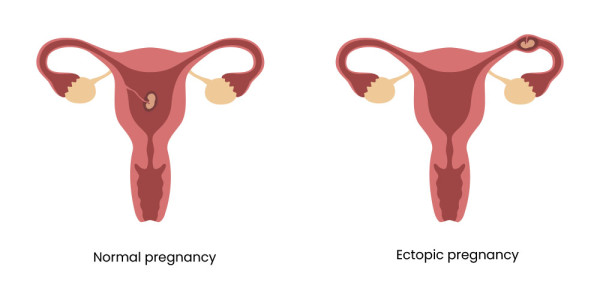Ectopic pregnancy Hapūtanga i waho i te kōpū
An ectopic pregnancy is when a fertilised egg attaches outside of the uterus, usually in a fallopian tube. It is not possible to save the pregnancy. Ectopic pregnancies can be dangerous and need immediate medical care.
Causes of ectopic pregnancy
An ectopic pregnancy happens in around 1 in 100 pregnancies. It is not usually known exactly what has caused an ectopic pregnancy. It may be caused by:
- damage or inflammation in your fallopian tube
- hormonal problems
- abnormal development of the fertilised egg.
An ectopic pregancy usually happens in your fallopian tubes (tubes that carry eggs from your ovaries to your uterus). This is also called a tubal pregnancy. Ectopic pregnancies can also happen in your ovary, cervix, or somewhere else in your abdomen (tummy), but this is rare.

Some things can increase your risk of an ectopic pregnancy, including:
- having had an ectopic pregnancy before
- having a sexually transmitted infection (STI) such as gonorrhea or chlamydia
- damage to your fallopian tubes from previous infection or surgery
- smoking.
Symptoms of an ectopic pregnancy
It is common to have some mild, period-like cramping and discomfort during the first trimester of pregnancy. But if you have significant pain or bleeding in early pregnancy, it is important you contact your midwife or doctor to find out what is causing it. These symptoms could be an ectopic pregnancy or a miscarriage.
Symptoms of an ectopic pregnancy can include:
- vaginal bleeding (this could be light)
- pain in your pelvic area
- pain at the tip of your shoulder
- unexplained runny poos (diarrhoea)
- fainting and dizziness.
Diagnosing an ectopic pregnancy
A doctor will examine you and arrange for you to have an urgent ultrasound scan if they think you have an ectopic pregnancy.
You may also have a blood test to look at the level of pregnancy hormone (hCG) in your blood.
The ultrasound scan will usually help show where the pregnancy is — in your uterus or somewhere else. Most women just need one ultrasound scan to pick up an ectopic pregnancy, but some need more scans.
Treating an ectopic pregnancy
An ectopic pregnancy is usually picked up before 12 weeks of pregnancy. Once you have been diagnosed with an ectopic pregnancy, there are 3 main treatment options depending on your situation.
Expectant management ('watch and wait')
Some ectopic pregnancies will end on their own without needing any treatment, so some women are offered an option of watching and waiting.
This option is available to women who:
- are not bleeding
- are not in pain
- have falling levels of the pregnancy hormone (hCG) in their blood (tested over 48 hours)
- have no foetal heartbeat on their ultrasound scan.
If you are treated this way, you will be monitored by your midwife or doctor to make sure the pregnancy is ending on its own as expected. You will need to have regular blood tests to check that your hCG levels keep falling.
Medicine
You may need to be treated with a medicine called methotrexate. This stops the fertilised egg from growing and ends the pregnancy. It is available for women who:
- are diagnosed early and are not otherwise unwell
- have confirmed there is no pregnancy in the uterus
- live within an hour of the hospital
- do not have any medical problems that mean they cannot take methotrexate.
Before being offered this treatment, you are likely to have blood tests and an ultrasound scan. If doctors recommend this treatment for you, they will give you more detailed information before the treatment starts.
Methotrexate injection for ectopic pregnancy — Healthifyexternal link
Surgery
If your ectopic pregnancy bursts (ruptures) and causes bleeding into your tummy you will need urgent surgery.
Surgery may also be recommended if:
- your ectopic pregnancy is likely to rupture soon
- the diagnosis is unclear and the ultrasound scan cannot rule out an ectopic pregnancy.
Most surgery is done as keyhole surgery (laparoscopy). But some women need open surgery (laparotomy).
During surgery, the pregnancy tissue is removed. If your pregnancy is in your fallopian tube, the fallopian tube is usually also removed (salpingectomy). If there is a problem with the other fallopian tube, the surgeon may try to repair the tube (salpingotomy).
After an ectopic pregnancy
It is a good idea to see your healthcare provider 2 to 3 weeks after having an ectopic pregnancy for a check-up.
Most women will be able to have a normal pregnancy after an ectopic pregnancy, even if one of their fallopian tubes has been removed. It is best to have at least one regular period before trying to get pregnant again. If you do not want to get pregnant straight away, make sure you use contraception.
An ectopic pregnancy can be very upsetting. Make sure you either see your healthcare provider or a counsellor early if you are finding it hard to cope after the loss of your pēpi.
There are many places you can get support and information, including the Sands New Zealand parent network.